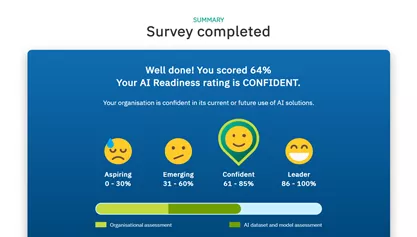
Artificial Intelligence (AI) is technology that can emulate human intelligence, autonomously solving both simple and complex tasks. AI initiatives by local governments and organisations have significant potential to increase the productivity and efficiencies of internal processes while also providing new solutions which benefit the wider community.
However, AI projects often face many organisational obstacles and shortcomings with the implications of an AI solution often not properly understood. This can significantly hinder the successful implementation of AI initiatives seeking to achieve better outcomes for people, planet and prosperity.
The City of Darwin has been a leader in smart cities action and investment to deliver better outcomes for its businesses, residents and visitors. The City has continued taking steps to embrace technology and data as an ‘accelerator for good’ by developing an AI Quick Start Guide.
The Guide is a survey-based tool which allows organisations to better understand their readiness to adopt and integrate AI solutions into their work and identify any organisational shortcomings which should be addressed. The guide also proposes viable methods to develop an AI solution.
The project was undertaken as part of the Australia-Singapore Digital Economy Agreement, with two key resources by the Infocomm Media Development Authority (IMDA) and Personal Data Protection Commission (PDPC) in Singapore providing inspiration. Both Singapore government organisations are acknowledged as world leaders in AI technology and governance.
The two resources which helped shape the Darwin Guide were:
- Second Edition of Singapore’s Model AI Governance Framework - The Model AI Governance Framework provides practical guidelines and recommendations of key ethical principles and concepts for organisations to implement artificial intelligence. This practical resource focusses on implementation and addresses key ethical and governance issues while also promoting public understanding and trust in AI.
- Implementation and Self-Assessment Guide for Organisations. (ISAGO) - This is a guide which contains a set of questions and practical examples to allow organisations to understand their current/future AI capabilities in accordance with the Model AI Governance Framework. This guide is thus a companion guide to the Model Framework, aiming to assist organisations in implementing AI initiatives for successful adoption.
Inside the Darwin AI Quick Start Guide is a set of 38 questions, split into two sections - organisational assessment and AI dataset and model assessment.
- Section 1: Organisational Assessment (16 questions) - This section explores the characteristics of the organisation and AI implementation, current policies and governance frameworks. Questions are focused on your organisation, objectives of your AI solution, current governance framework, the level of human intervention and stakeholder interactions.
- Section 2: AI dataset and model assessment (22 questions) - This section focuses on technical details of the existing or proposed AI solution, intended to be completed by individuals who possess the expertise and understanding of the AI initiative development and design. Questions are focused on accountability, whether systematic and unintended biases were mitigated, verifying the accuracy of data and AI model as well as how the AI model is being validated.
At the end of the survey a score is presented on a scale from 0% - 100%, breaking down the organisation’s confidence in its use of AI solutions into 4 categories.
- Aspiring (0-30%)
- Emerging (31-60%)
- Confident (61-85%)
- Leader (86-100%)
Furthermore, the survey provides a breakdown of your response to each question, guiding improvement and good implementation on each aspect.
Through resources such as the City of Darwin AI Quick Start Guide organisations are able to increase their understanding of AI and their readiness to adopt the technology and help power greater insights and actionable intelligence.



